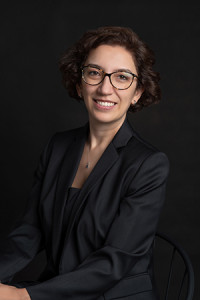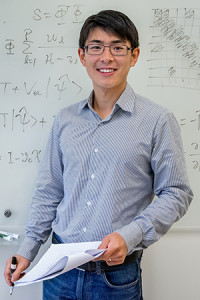Alvarez Seminar Series
Berkeley Lab's Luis W. Alvarez Fellowship in Computing Sciences offers upcoming or recent Ph.D.'s the opportunity to work on some of the most important research challenges in computing sciences at a national lab synonymous with scientific excellence. Since its founding in 2002, the fellowship has cultivated exceptional young scientists who have gone on to make outstanding contributions to computational and computing sciences as researchers, professors, and in the private sector. The Alvarez Seminar Series brings these current and previous Alvarez Fellows together for a chance to share their research and career paths with time for networking.
This seminar series is held virtually every other Tuesday from 10 - 11 a.m. PT beginning March 22, 2022.
Zoom Meeting ID: 915 2814 8092
Passcode: 293491
Jackie Yao and Aditi Krishnapriyan host the series.
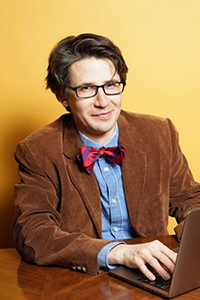
Joshua Schrier
Adventures in Computational Materials Discovery: From Simulation to Data to Automated Labs
Joshua Schrier, 2005 Alvarez Fellow
Fordham University
Date and Time TBA
Abstract: New materials are needed for a variety of energy technologies, and progress is slow because these materials are typically discovered through a tedious laboratory process of trial and error. In this talk, I will discuss some of my adventures in this field, starting from my time as an Alvarez Fellow (2005-2008) working on large-scale density functional theory methods and interior eigenvalues for simulating inorganic semiconductor nanostructures, screening organic materials for electronics and battery applications, and early attempts to apply machine learning methods to experimental materials synthesis. I’ll talk about some of the challenges in scientific data management and progress towards and open challenges related to autonomous (“self-driving”) laboratories.
Bio: Joshua Schrier is the Kim B. & Stephen E. Bepler Professor of Chemistry at Fordham University in New York City. He received his Ph.D. in Theoretical Physical Chemistry from UC Berkeley in 2004, and was the Luis W. Alvarez Postdoctoral Fellow in Computational Sciences at Lawrence Berkeley National Laboratory from 2005-2008. He was on the faculty of Haverford College (2008-2018) prior to joining Fordham in 2018. His research interests include the use of atomistic simulations and data-science methods to advance the discovery and understanding of new materials.
Past Talks
The Power of Data and Experimental Advantages in Quantum Machine Learning
Jarrod McClean, 2015 Alvarez Fellow
Google Quantum AI
March 22, 2022
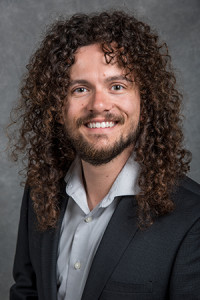
Jarrod McClean
Abstract: Quantum technology has the potential to revolutionize how we acquire and process experimental data to learn about the physical world. An experimental setup that transduces data from a physical system to a stable quantum memory, and processes that data using a quantum computer, could have significant advantages over conventional experiments in which the physical system is measured and the outcomes are processed using a classical computer. We prove that, in various tasks, quantum machines can learn from exponentially fewer experiments than those required in conventional experiments. The exponential advantage holds in predicting properties of physical systems, performing quantum principal component analysis on noisy states, and learning approximate models of physical dynamics. In some tasks, the quantum processing needed to achieve the exponential advantage can be modest; for example, one can simultaneously learn about many noncommuting observables by processing only two copies of the system. Conducting experiments with up to 40 superconducting qubits and 1300 quantum gates, we demonstrate that a substantial quantum advantage can be realized using today's relatively noisy quantum processors. Our results highlight how quantum technology can enable powerful new strategies to learn about nature.
Bio: Jarrod McClean completed his undergraduate degree in chemistry at UC Berkeley in 2006, where he studied quantum Monte Carlo for electronic structure with Professor William Lester. He earned his graduate degree in chemical physics from Harvard University, where he worked with Professor Alan Aspuru-Guzik on a combination of electronic structure and quantum computing. From 2015 to 2017, he was the Berkeley Lab Alvarez fellow working primarily on quantum computing for quantum chemistry, with a strong interest in information sparsity. After his fellowship, McClean joined the Google Quantum AI group, where he’s been ever since. His current work focuses on a combination of quantum computing, machine learning, error reduction, and simulation of physical systems. McClean can be found windsurfing or pickling in the woods just outside Hood River, OR in his free time.
Quantum Computing Meets Condensed Matter Physics
Alexander (Lex) Kemper, 2012 Alvarez Fellow
North Carolina State University
April 5, 2022
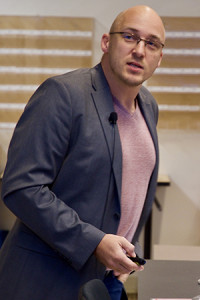
Lex Kemper
Abstract: I will share some of the progress that has been made at the intersection of quantum computing and condensed matter physics. I’ll briefly tell you what both of those things are and explain why they make for good partners as we try to understand the properties of quantum systems. Our recent work has focused on how to make today’s quantum computers useful for solving problems in condensed matter, which requires some judicious choices of not only method but of problems too. Finally, I will endeavor to convince you that we might actually be able to solve problems on quantum computers sometime in the near future (even without the vaunted error correction).
Bio: Lex Kemper got his graduate degree from the University of Florida, where he worked on the theoretical description of newly discovered Fe-based high-temperature superconductors using a combination of phenomenological and quantum chemistry approaches. He moved to Stanford University for a postdoc, where he shifted focus to work on non-equilibrium quantum matter – condensed matter physics-driven out of equilibrium using ultrafast lasers. After two years, he moved across the bay to Berkley Lay where he was an Alvarez Fellow from 2012 to 2015, and where he continued to work on non-equilibrium condensed matter physics. He is now associate professor at North Carolina State University, where his research interests have taken a partial tack into the intersection of quantum computing and condensed matter physics.
Profiling Tools for Data Locality
Didem Unat, 2012 Alvarez Fellow
Koç University, Istanbul
April 19, 2022
Didem Unat
Abstract: In this talk, I will present two profiling tools that my group developed to measure data locality aspects of an application running on a multicore system. Our tools make use of performance monitoring units in a unique way to lower the overhead of profiling. One of such tools is ComDetective, which monitors inter-thread communication. The second tool is ReuseTracker, which analyzes reuse distance in private and shared caches. We expect that both ComDetective and ReuseTracker pave the way for a new generation of low-overhead profiling tools and they can be used by the end-users to improve data locality aspects of their software.
Bio: Didem Unat is a faculty member at Koç University and director of the Parallel and Multicore Computing Laboratory. She is the first researcher from Turkey to receive ERC funding from the European Research Council in the field of Computer Science for her project BEYONDMOORE for the 2021-26 period. She is currently acting as the project coordinator of the €2.6 million EuroHPC partnered project. She was named “Emerging Woman Leader in Technical Computing” by ACM SigHPC in 2021, the first recipient of this award outside the United States. She is known for her work on programming models, performance tools, and system software for emerging parallel architectures. She received her Ph.D. degree from the University of California San Diego, and later the Luis Alvarez Postdoctoral Fellowship in 2012 from Lawrence Berkeley National Laboratory. She received the Marie Sklodowska-Curie Individual Fellowship from the European Commission in 2015, the BAGEP Award from the Turkish Academy of Sciences in 2019, and the British Royal-Newton Advanced Fellowship in 2020.
Sparse Matrices for Scientific Data Analysis and Machine Learning
Aydın Buluç, 2010 Alvarez Fellow
Lawrence Berkeley National Laboratory
May 17, 2022
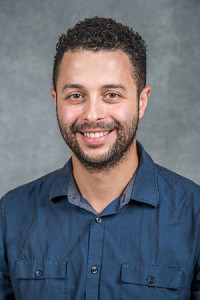
Aydın Buluç
Abstract: In addition to the traditional theory and experimental pillars of science, we are witnessing the emergence of three additional recent pillars, which are simulation, data analysis, and machine learning. All three recent pillars of science rely on computing but in different ways. Matrices, and sparse matrices in particular, play an outsized role in all three computing related pillars of science, which will be the topic of my talk.
I will first highlight some of the emerging use cases of sparse matrices in data analysis and machine learning. These include graph computations, graph representation learning, and computational biology. The rest of my talk will focus on new parallel algorithms for such modern computations on sparse matrices. These include the use of “masking” for filtering out undesired output entries in sparse-times-sparse and dense-times-dense matrix multiplication, new distributed-memory algorithms for sparse matrix times tall-skinny dense matrix multiplication, combinations of these algorithms, and subroutines of them.
Bio: Aydın Buluç is a Staff Scientist at the Berkeley Lab and an Adjunct Assistant Professor of EECS at UC Berkeley. His research interests include parallel computing, combinatorial scientific computing, high performance graph analysis and machine learning, sparse matrix computations, and computational biology. Previously, he was a Luis W. Alvarez postdoctoral fellow at LBNL during 2010-2012 and a visiting scientist at the Simons Institute for the Theory of Computing. He received his PhD in Computer Science from the University of California, Santa Barbara in 2010 and his BS in Computer Science and Engineering from Sabanci University, Turkey in 2005. Dr. Buluç is a recipient of the DOE Early Career Award in 2013 and the IEEE TCSC Award for Excellence for Early Career Researchers in 2015. He was a founding associate editor of the ACM Transactions on Parallel Computing.
Surrogate Model-Based Optimization and Active Learning for HPC Applications
Juliane Mueller, 2014 Alvarez Fellow
National Renewable Energy Lab (NREL)
May 31, 2022
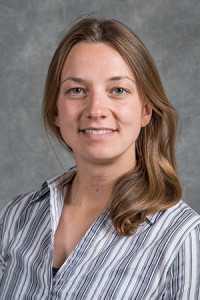
Juliane Mueller
Abstract: High performance computing is crucial in many applications important to the Department of Energy for simulating complex physical phenomena, including climate sciences, high energy physics, and combustion research. These simulations usually contain parameters that determine how well the simulation represents reality. Optimizing these parameters is a computationally expensive task as it may take several minutes to hours to run the simulations with a given parameter set. Efficient optimization algorithms that do not rely on derivative information of the simulation objective function are needed. In this talk, I will present an overview of surrogate model algorithms that use active learning strategies to tackle these types of black-box expensive optimization problems. I will discuss the importance of taking different problem characteristics into account when modeling the optimization problem and developing the algorithms.
Bio: Juliane Mueller is Group Manager for the AI, Learning and Intelligent Systems Group at the National Renewable Energy Lab (NREL) in Golden, CO. At the time of her Alvarez Seminar talk, she was a staff scientist in the Applied Mathematics and Computational Research Division at Berkeley Lab. She received her Ph.D. in Applied Mathematics from Tampere University of Technology in Finland in 2012. After a postdoctoral appointment at Cornell University, she joined Berkeley Lab in 2014 as the Alvarez Fellow in Computing Sciences.
Mueller's work focuses on developing derivative-free optimization algorithms for the compute-intensive black-box problems that arise throughout the domain sciences, including earth sciences, high energy physics, quantum computing, combustion, etc. Mueller believes that efficiently solving optimization problems allows scientists to improve their simulation models, enabling them to better understand underlying physical phenomena, derive sustainable resource use policies, and make more informed decisions. Mueller can be found in the mountains rock climbing, snowboarding, backpacking, or mountain biking in her free time.
High-performance Graph Analytics
Kamesh Madduri, 2008 Alvarez Fellow
Lawrence Berkeley National Laboratory
June 28, 2022
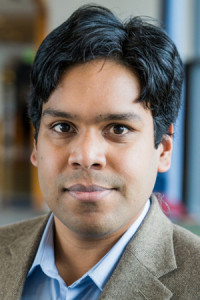
Kamesh Madduri
Abstract: As we enter the exascale era, supercomputers are now capable of processing petascale graphs in minutes. In this talk, I will review advances in parallel graph algorithms and high-performance implementations exemplified by more than twelve years of submissions to the Graph500 breadth-first search benchmark. I will present a simple, intuitive, and powerful speedup strategy that promises to accelerate a large collection of graph problems. I will also discuss single-node shared-memory algorithms developed by my research group for the graph analysis tasks of multilevel graph partitioning, graph coarsening, spectral graph drawing, k-core decomposition, and triad census.
Bio: Kamesh Madduri is an associate professor in the College of Engineering at The Pennsylvania State University. He received his Ph.D. in Computer Science from Georgia Tech and was previously a Luis W. Alvarez postdoctoral fellow (2008-10) at Berkeley Lab. In addition to high-performance graph analytics, Kamesh is also currently interested in interpretable methods for natural language processing problems, computer-assisted decision-making in higher education, and medical informatics. He is a recipient of the NSF CAREER award (2013), a co-recipient of the best paper award at the 42nd International Conference on Parallel Processing (2013), and was awarded the first Junior Scientist prize by the SIAM Activity group on Supercomputing (2010).
High-Order Implicit Shock Tracking
Matthew Zahr, 2016 Alvarez Fellow
University of Notre Dame
July 26, 2022
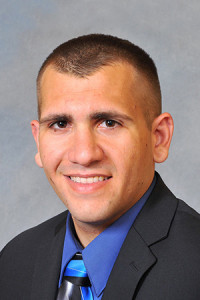
Matthew Zahr
Abstract: High-order implicit shock tracking (fitting) is a new class of numerical methods to approximate solutions of conservation laws with non-smooth features, e.g., contact lines, shock waves, and rarefactions. These methods align elements of the computational mesh with non-smooth features to represent them perfectly, allowing high-order basis functions to approximate smooth regions of the solution without the need for nonlinear stabilization, which leads to accurate approximations on traditionally coarse meshes. The hallmark of these methods is the underlying optimization formulation whose solution is a feature-aligned mesh and the corresponding high-order approximation to the flow. In this talk, I will introduce the High-Order Implicit Shock Tracking method and its application to several shock-dominated flows.
Bio: Matthew Zahr is an assistant professor in Notre Dame’s Aerospace and Mechanical Engineering Department. He received his Ph.D. in Computational and Mathematical Engineering from Stanford University in 2016. From 2016-to 2018, he was the Luis W. Alvarez Postdoctoral Fellow in the Department of Mathematics at Berkeley Lab. His research interests include high-order methods for computational physics, PDE-constrained optimization, model reduction, computational methods for resolving shocks and discontinuities, and multiscale methods.
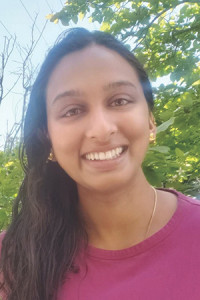
Aditi Krishnapriyan
Machine Learning for Science:
A two-way street
Aditi Krishnapriyan, 2020 Alvarez Fellow
Lawrence Berkeley National Laboratory
August 9, 2022
Abstract: Machine learning (ML) has seen great success in numerous fields, and is also seeing interest in the scientific domain. However, many challenges remain, as learning meaningful ML models for scientific applications is difficult and often limited by the lack of training data. In this talk, I will discuss our efforts to overcome these challenges by developing ML methods motivated by challenges in domains ranging from the need for more efficient and accurate spatiotemporal modeling, to accelerating quantum mechanical simulations. These methods include incorporating physical invariances directly into neural network architectures, to better learning strategies to address distribution shifts in scientific data. A recurring theme in this talk will be that rather than seeing science as a “downstream” application from ML, the influence of scientific mechanistic modeling on ML algorithms will also be crucial to making progress in this interdisciplinary space.
Bio: Aditi Krishnapriyan an incoming assistant professor at UC Berkeley. She received her PhD at Stanford University in 2019, and was an Alvarez Fellow at LBNL from 2020 - 2022. Her research focuses on developing new methods in scientific machine learning to improve understanding and discovery for scientific problems, with particular interest in sustainable and renewable energy applications.
Exploring Post-Moore Microelectronics with High-Performance Computing
Jackie Yao, 2019 Alvarez Fellow
Lawrence Berkeley National Laboratory
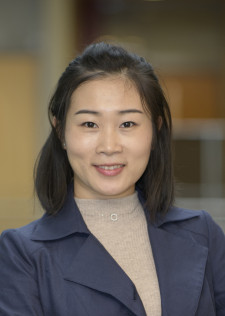
Jackie Yao
Abstract: The post-Moore's law era has seen unprecedented prosperity of electronic microdevices harnessing novel wave-material interactions beyond conventional single-phase materials. However, gaining an in-depth understanding of the interaction between the waves and materials has been difficult because of the inherent disparity in time and length scale and the lack of effective modeling techniques.
My research has been focused on addressing these challenges by developing scalable simulation tools to model and design emerging post-CMOS microelectronic devices (electronic, ferroelectric, nanomagnetic, and nanomechanical). In this talk, I will introduce a couple of our recently developed code packages which are GPU-enabled, open source, and supportive of heterogeneous physical coupling. We have demonstrated the algorithmic flexibility and the massively parallel nature, which are far beyond the reach of commercial tools, allowing us to capture larger-scale spatial disparities inherent to realistic devices. In the long term, I aim to incorporate more complex physical coupling previously disregarded due to the difficulty in existing numerical solutions, enabling designers to “improvise” their devices, and enabling easy access to Beyond Moore’s Law design tools.
Bio: Zhi (Jackie) Yao was the 2019 Luis W. Alvarez postdoctoral fellow, and is currently a Research Scientist at Berkeley Lab at the Center for Computational Science and Engineering. Her current research interest is on physical modeling and design of microelectronic device components and quantum circuitry, beyond Moore’s law devices, high performance computing and GPU codes. She obtained the M.S. degree in 2014 and the Ph.D. degree in 2017, both from the ECE Department at UCLA. Her past research works include designing and characterizing innovative high-frequency devices with smart martials and heterogeneous physical modeling. She intends to invest her interdisciplinary training to investigate the fundamental of wave-material interactions and how such insights inspire new electronic applications and devices.
Accelerating New Materials Design with Supercomputing and Machine Learning
Anubhav Jain, 2011 Alvarez Fellow
Lawrence Berkeley National Laboratory
September 13, 2022
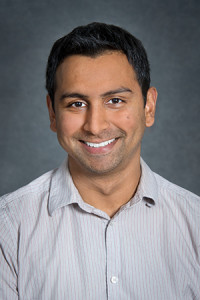
Anubhav Jain
Abstract: In this talk, I will begin by briefly introducing my career trajectory thus far, starting prior to the Alvarez fellowship and continuing to today. The research topic covered in this talk will be about how computing and machine learning are transforming the way researchers design new materials for energy storage, energy conversion, catalysis, and other applications. Part of the talk will cover The Materials Project, an effort that started as an internal LDRD project and now serves ~250,000 registered users worldwide and is a DOE core program. I’ll also cover new developments in machine learning that are changing the way research is being done, including using natural language processing to “read” large amounts of scientific text and extract data and information. I’ll touch upon new efforts to automate lab synthesis, and share experiences along the way with developing and maintaining open source software packages.
Bio: Anubhav Jain is a 2011 Alvarez Fellow and currently a Staff Scientist/Chemist at LBNL focusing on new materials discovery using high-throughput computations. He received his B.E. in Applied & Engineering Physics from Cornell University and his PhD from the Massachusetts Institute of Technology under the supervision of Gerbrand Ceder. Apart from the Alvarez Fellowship, he is a recipient of the DOE Computational Science Graduate Fellowship a DOE Early Career Award, and a Berkeley Lab Director's Award for Early Scientific Achievement.
Quantum Algorithms for Eigenvalue Problems
Lin Lin, 2011 Alvarez Fellow
UC Berkeley, Lawrence Berkeley National Laboratory
September 20, 2022
Abstract: The problem of finding the smallest eigenvalue of a Hermitian matrix (also called the ground state energy) has wide applications in quantum physics, quantum chemistry, materials science etc. I will discuss two classes of quantum algorithms for solving such eigenvalue problems with near-optimal query complexities: those suitable for full-scale fault-tolerant quantum computers, and those suitable for early fault-tolerant quantum computers.
Bio: Lin Lin received his B.S. degree in Computational Mathematics from Peking University in 2007, and Ph.D. degree in Applied and Computational Mathematics from Princeton University in 2011, advised by Professor Weinan E and Professor Roberto Car. His research focuses on the development of efficient and accurate numerical methods for electronic structure calculations, with broad applications in quantum chemistry, quantum physics and materials science. His recent research interests also include quantum algorithms for scientific computation, and neural network methods for quantum systems. He is now an associate professor in the Department of Mathematics at UC Berkeley, a faculty scientist at Berkeley Lab’s Mathematics Group within the Computational Research Division, and a mathematician within Berkeley Lab's Center for Advanced Mathematics for Energy Research Applications (CAMERA). He received the Sloan Research Fellowship (2015), the National Science Foundation CAREER award (2017), the Department of Energy Early Career award (2017), the SIAM Computational Science and Engineering (CSE) early career award (2017), the Presidential Early Career Awards for Scientists and Engineers (PECASE) (2019), the ACM Gordon Bell Prize (Team, 2020), and the Simons Investigator in Mathematics award (2021).
Short Stories from a Computational Physicist’s Perspective
Andreas Adelmann, Inaugural Alvarez Fellow, 2002
Paul Scherrer Institut, Switzerland
October 4, 2022
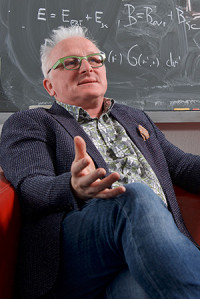
Andreas Adelmann
Abstract: I will take you on a guided tour where we combine physics modeling with high performance computing and numerical mathematics. We will discover how to reduce nuclear waste, search for sterile neutrinos, and develop highly parallel open source software within a multinational team. Towards the end of our journey I will share ongoing works regarding surrogate and inverse models using deep learning techniques and Exascale computing.
Bio: Andreas Adelmann is a senior scientist and head of the interdisciplinary Laboratory for Scientific Computing and Modeling with close to 30 scientists at the Paul Scherrer Institut in Switzerland. At ETH, he teaches courses in accelerator modeling, computational physics and leads a seminar on computational physics. Dr. Adelmann obtained a Ph.D. in applied mathematics from the ETH Zurich on the subject of numerical modeling of high-power cyclotrons. His research interests include advanced accelerator concepts, non-linear dynamics, large-scale optimization, and machine learning. In 2001, Dr. Adelmann was the first recipient of the Alvarez fellowship in computational science awarded by the Lawrence Berkeley Laboratory. In 2012, together with researchers from ETH Zurich and IBM Research Zurich, he received the PRACE award, recognizing a breakthrough in science achieved with high-performance computing resources in the area of reduced-order modeling and optimization.
A Tale of Scientific Workflows
Lavanya Ramakrishnan, 2009 Alvarez Fellow
Lawrence Berkeley National Laboratory
October 18, 2022
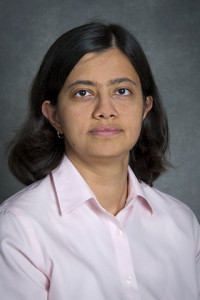
Lavanya Ramakrishnan
Abstract: Scientific workflows developed as a construct to manage the computation and data over a distributed set of resources. More recently, the volume, veracity, and velocity of data generated by the accelerators, colliders, supercomputers, light sources and neutron sources at DOE Office of Science user facilities have grown exponentially in the last few years. It is necessary that we develop appropriate capabilities and tools to understand, analyze, preserve, share, and make optimal use of data. Intertwined with data are complex human processes, policies and decisions that need to be accounted for when building software tools. In this talk, I will cover the evolution of scientific workflows and our research over the past 20 years. I will discuss our dual approach that combines computer science techniques with user research that focuses on understanding user behaviors, needs, and motivations to build next generation software ecosystems around user and HPC facilities.
Bio: Lavanya Ramakrishnan is a Senior Scientist and Division Deputy in the Scientific Data Division at Lawrence Berkeley National Lab. She started at the Lab in 2009 as an Alvarez fellow and has also served a group lead for the Usable Software Systems group. Her research interests are in building software tools for computational and data-intensive science with a focus on workflow, resource and data management. More recently, she has been using user research methods to understand as well as verify/validate the context of use and social challenges that often impact tool design and development. She currently leads a number of project teams that consist of a mix of social scientists, software engineers, and computer scientists.







 Instagram
Instagram YouTube
YouTube